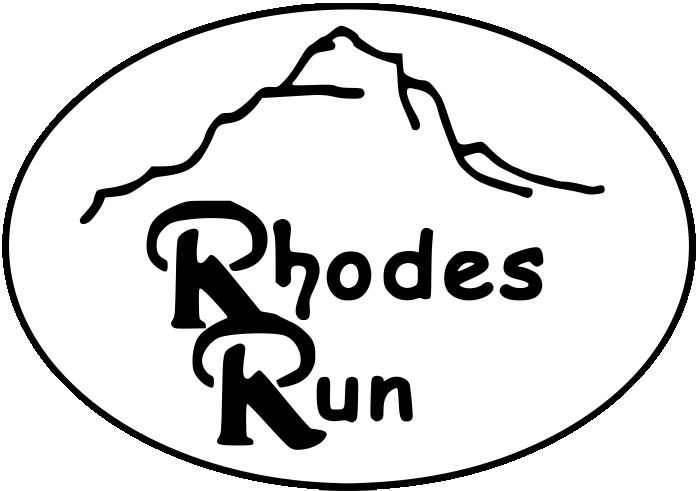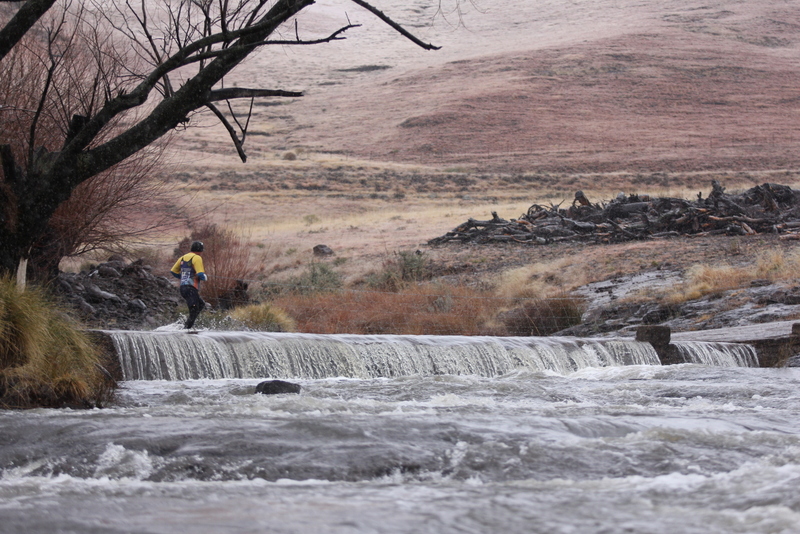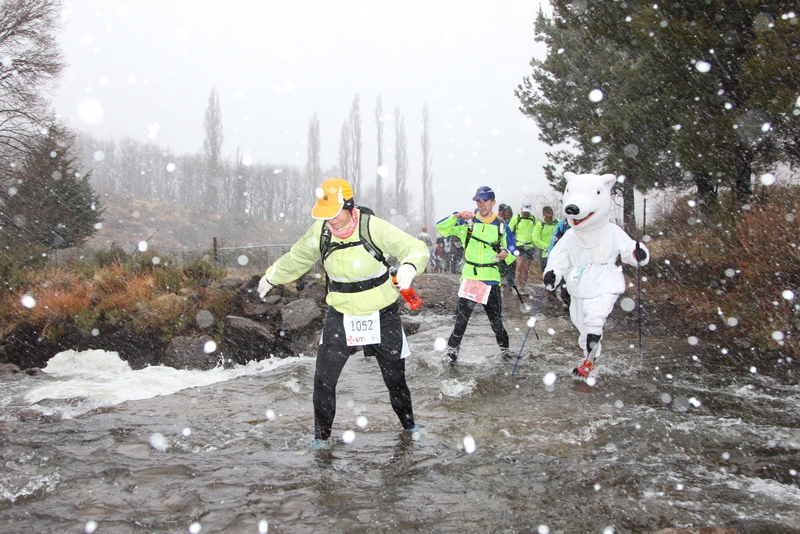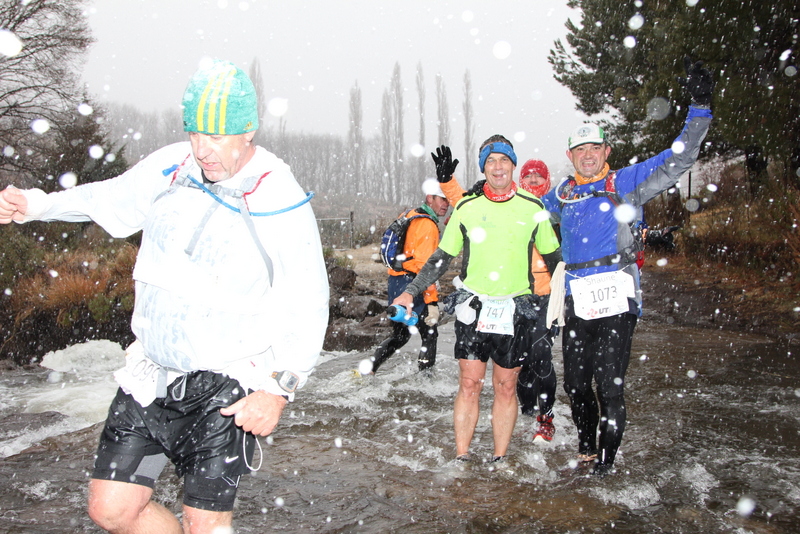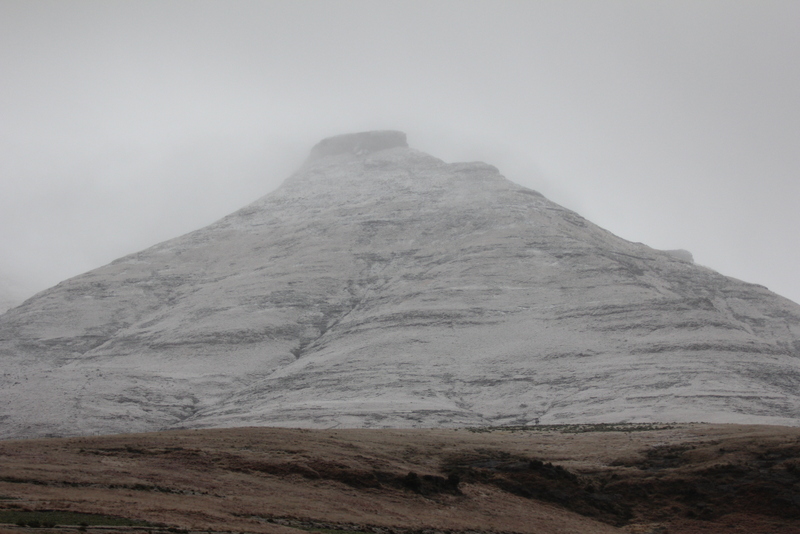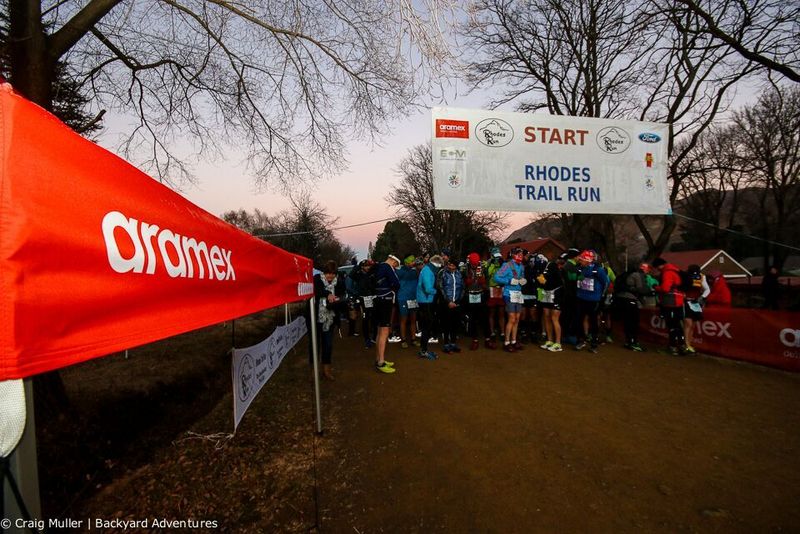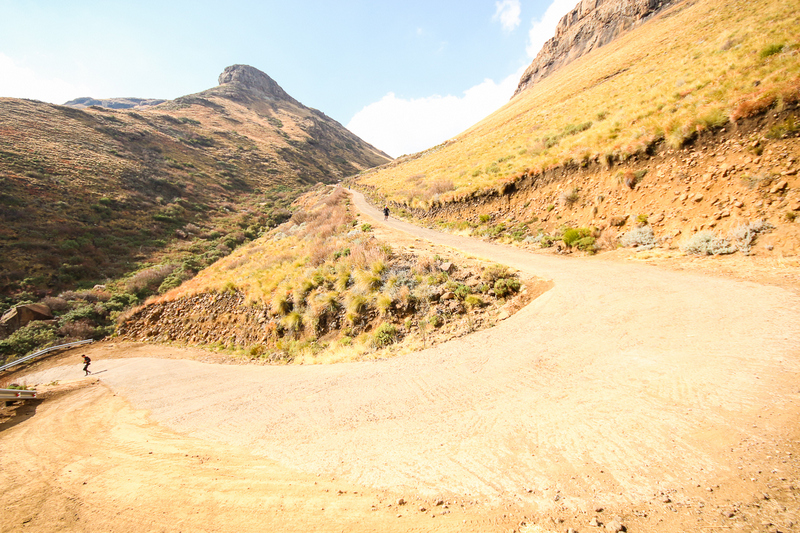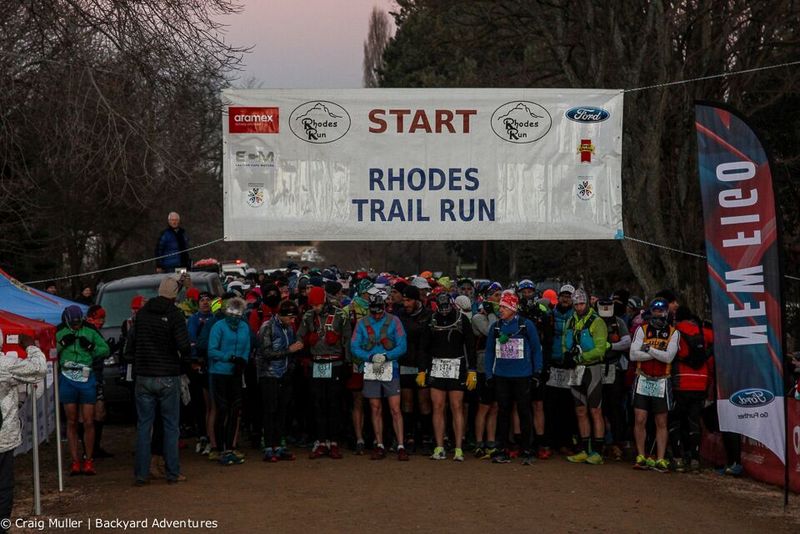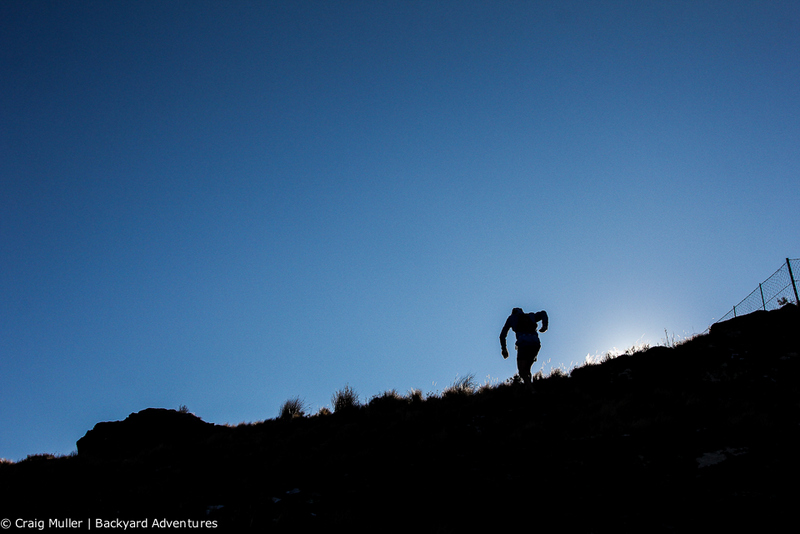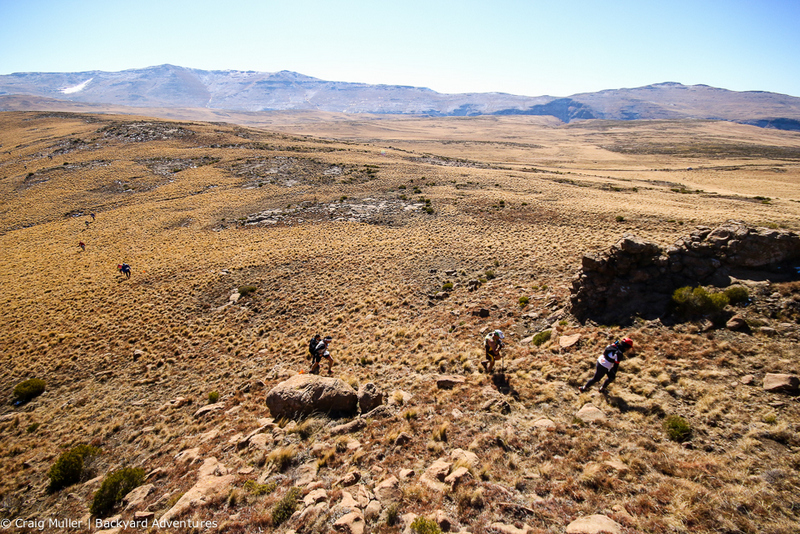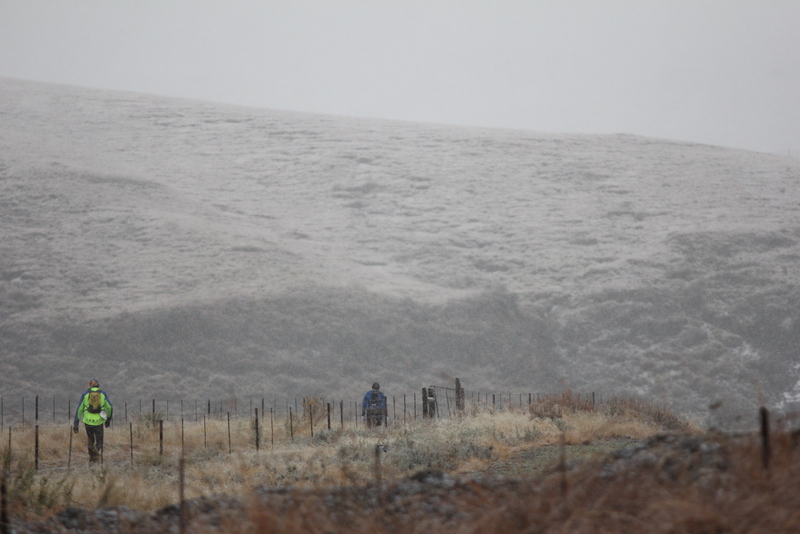The Mad-Hatters Tea Party (The Norwich Life Rhodes Drakensberg 52K Ultra-Marathon) by Rudi Rode
Article from the August 1989 issue of the Rand Athletic Club newsletter
On Tuesday morning I finally realised what was meant by the expression "the crack of dawn". My deep sleep had been rudely interrupted by the noise of the hail bouncing off the roof, shattering a few tiles in the process.
The weatherman was venting his wrath and Chicken Little had been proved right. The sky was falling. If the end of the world had now begun on the Highveld, how far must it not have progressed at the ar...other end of the world? It was not very long before my worst fears had been confirmed. Hell had frozen over. So, too, had the highlands of the North-eastern Cape. Even the passes had been closed. And there were only four days to go.
It was then I began to wonder whether They were not right after all. My nearest and dearest had, in no uncertain terms, told me that I was no longer in possession of all my faculties. My colleagues, too, had seemed a little doubtful as to my state of mind. But when road-runners, who are at the best of times considered mentally not the most stable, start making remarks that reflect upon one's sanity, it is time to reconsider the proposed course of action.
Reconsideration duly took place. A tete-a-tete in a nice warm coffee-bar confirmed that we were completely sane, a conclusion that was reached without a dissenting voice being raised, therefore; Onward and upward.
The invading forces were gathering. From all corners they came. From the East did they come, and from the West. From the South, and from the North - and even from RAC. They came in Droves (and some in other models, too). From many miles away the snow-capped mountains could be seen and as they drew closer the excitement grew, until the snow was beside us, striving to survive in the warm rays of the sun.
As we got closer to our destination, the pools of snow seemed to move closer and closer together (Blessed be the inventor of the heater, for long shall he bask in it's warmth) until they started merging into larger and larger patches and the scenery became more and more picturesque.
By the end of the day the bar at the only hotel in town was filled to capacity. More trade was done in that one night than in the previous six months. The camaraderie was typical of a mad-cap bunch of the most eccentric long-distance runners in the land. No-one knew quite what to expect. Would the cold be bearable?; What would the off-road section be like?; Would the mountain have to be climbed?; Would the river be fordable?....Would, (in hushed tones), would we all survive the next day?
With the race starting at seven in the morning - a reasonably civilised hour by normal standards - one would expect some sign of life at the start by six. But no, nothing was stirring, not even a mouse. They had all frozen stiff. By six-thirty there was movement here and there, almost as though out of desperation, for the cold was intense. It was rumoured that the temperature had risen to eleven degrees below zero.
The bell that was to be used to signal the start had had it's clappers frozen solid (not only the bell suffered in that way) and the start was delayed by some ten minutes, during which time two of the 72 who had registered as starters decided to go back to bed. The remainder were dressed, as all good runners should be, in club colours. Though in which wonderland those clubs are to be found, only Alice would be able to tell.
At last, the contest commenced. The first few kilometres would be along the main road. That should be easy. The bridges had not been flooded and rope hand-rails were not required after all. Easy. Starting at 6000ft - on a gravel road that could only be described as Hilly. Easy. Just ask the guys who had come up from the coastal towns. Breathing is something some of us take for granted. Easy. Huh!
After some six K's the first tables were encountered in the midst of some really lovely scenery. It was here that we turned off the "national road" and on to the local farm roads. The difference was hardly noticeable, the farm roads were not really that much better. The beauty of the surroundings, however, made up for the condition of the tracks. In fact, so lovely was it that one of the runners was using up some of the precious nine hours that were allowed for the 52k to take photographs using a camera that he was carrying with him all the way.
The next few picturesque kays were to take us to the point of no return - the portals of The Unknown. At that point each of us handed a tag with name, race number, and name and address of next of kin, to the marshall on duty. It only became clear later why he was wearing his collar the wrong way round, and why the few words that he muttered sounded ominously like the last rites. A hand silently pointed us in the direction in which we were expected to proceed. A small path led down to the frozen waters of a tributary of the River Styx. Stark forbidding branches of a long-dead tree guarded the spot at which the waters had to be crossed. A cry rang out. A once-beautiful lady rose, dripping, from the depths. A warning to all. Beware, he who crosses here. The challenge accepted, the waters were crossed.
The path continued through the undergrowth to a gate where another marshall stood silently and impassively pointing the way. Onward; Upward. The climb was commencing. Gradually at first, the path became steeper and more difficult to follow. A sheer drop on the right to the river far below. A steep climb to the left where no human could go. Onward we struggled. The chirping long stilled. The human chain was breaking into smaller groups.
The silence was broken only by the cracking of the ice in the river below, as the sun warmed the waters, and by the occasional cry of pain as bodies were mutilated by thorns. The patches of snow were melting slowly and the water was forming rivulets which were immediately freezing upon the rocks, creating yet another treacherous hazard. In other places the melting snow had turned the earth to mud which had in turn been turned to slush. In yet other spots the snow had not yet succumbed to the rays of the sun, and lay thick and cold in pools of shade.
Here and there a flag marked the route; here and there a marshal silently pointed the way. Onward and upward. Sometimes scrambling downward. Sometimes negotiating the dangerously thin ice that protected the waters of the river. From the broken ice and wet footprints, it was obvious where others had come to grief. Upward yet again. Until suddenly, after many hours of suffering, a hand appeared from nowhere and a sachet to ease the torment was pressed into one's frozen palm.
By now the blood was flowing freely down one's legs, staining the virgin snow a bright crimson. One's feet belonged to someone else; the thoughts of frostbite, gangrene, and even amputation no longer horrified, but were considered unemotionally, the last-mentioned almost with a sense of relief. "Just one more kay to go to the top". The climb had not yet even begun. That last kay was straight up. "Nearer, my God, to thee". The words of that well-known hymn kept passing through my mind. The chicken-mesh fence by which we pulled ourselves to the top, step by painful step, cut deep into the palms of the hands. Yet the cuts went unnoticed. At times the rocks were covered in a thick layer of ice; at times one was left hanging from the fence with feet dangling over into space. The snow got perceptibly thicker the higher we climbed. "Because it's there" will never again make any sense. There must be better excuses for lunacy.
At last the top is reached. But no; it is a false top. The senses are no longer believed. Until, at long last, the breath rasping from one's lungs, one looks down and around at a fairy-tale wonderland of snow. The conquerer who can triumphantly deliver another name and number sticker into the hands of the waiting official. Hot soup, cold coke, water - what a change from having to slake one's thirst by chewing handfuls of snow. A tent with two heaters going full blast - a place in which to thaw out. A marker informed us that 21,5k had been completed. A half-marathon in just under four hours? Fact, not fiction.
"Flat ground from here" announced an official "just follow the road". His arm pointed upward to the surrounding hills. The horizontal plane had shifted. Else the inner ear was no longer what it might have been. The Official had to be believed.
A few steps later and the white earth gave way. The snow was at least a foot deep. One had to stay within the tracks left by the 4-wheel drive vehicles that had so kindly provided us with marshals and nourishment at the top of the climb. But the tracks were wide enough for one foot only. And the compacted snow was more like ice. So; run carefully, one foot at a time, one foot behind the other. (Don't laugh, try it - one RACer, who shall remain anonymous, fell flat on his face at least 5 times. And he had left the pub reasonably early.)
Here and there there was relief from the snow - it had been churned up into the most yucchie, slippery muck imaginable. It was often easier to wade through foot-deep drifts than to stay on the straight and narrow. Purgatory could never have been imagined as being set in such magnificent surroundings. The mountain-tops were not far above and Ben McDhui - the highest point in the Cape - was almost within spitting distance (for those that still could). Slipping and sliding through the pitch-black muck we proceeded along next to the perfectly white untouched beauty, passing close to the ski-slopes in a world remote and silent.
Mile after mile the struggle continued, cramps claiming a couple of victims who collapsed, wallowing in the slush. At last an area was reached where the ground seemed to be firmer. The descent had begun. The race pamphlet had stated that "a steep decent (sic) drops the runner from the mountain plateau into the valley (dropping several hundred feet per kilometer)". Decent? Hardly. Believable? Never. Grossly exaggerated of course. Not at all - not exactly decent, but quite true. An understatement, if anything. The "road" had been concreted on the steepest section and it was difficult to walk down, let alone run. The fear of falling over forwards caused one to brake all the way down. Cambered corners were negotiated with care, lest one overran them. The hills among which we had been ru..sliding a few minutes earlier were suddenly changed into mountains towering high above.
And the beauty of the valley was breathtaking.
Within a very short space of time the floor of the valley was reached and the remaining twelve kays were on what could be considered a fairly good undulating, gravel road. True, there was still much slipping and sliding, but by that time one was used to it. There were one or two low-level bridges where one could try to wash the worst of the mud off ones shoes.
And there were refreshment tables around every bend in the road, manned by cheerful helpers. One could enjoy the beauty, notwithstanding the enveloping mists of fatigue. A last little hill into town, a right-hand corner, and the finish but a 100 meters down the road. A T-shirt, a towel, and a dinner-gong are pressed into one's hands. The dinner-gong has a ribbon attached, but is far too large to hang around one's neck before some strength has returned.
A cup of soup works miracles and one becomes aware of the atmosphere of excitement and delight at the experience of a life-time. Seventy starters, seventy finishers (the last one dead on 9 hours). Every one a wi..survivor. Every one will do his/her damndest to be back next year. The prize-giving was attended by all the participants; runners, helpers, townsfolk - even the organisers were there.
Gold and silver dinner-gongs were handed out, with Mike Foreshaw (4h58) and Mariette Sassenburg (5h21 - 4th overall) being the winners. Yet again, the atmosphere was unbelievable. The organisers, Brian Wimpey and Reinhard le Roux, their wives and (ex-) friends are to be congratulated on, and thanked for, a tremendous event. Their health (and much else) was toasted extensively that evening.
The hotel, and the town of Rhodes, will never be quite the same again. RAC was as usual well represented - Jon Bell, (third Vet), Bill Brown, Malcolm Hepplewhite, Ray Wallace, Dave Watson, Mike Whiley, Rudi Rode, et al. Middelburg (Tvl) would have won the team prize, but the three Florida Panthers had the best individual results - first overall and third lady.
The weatherman was venting his wrath and Chicken Little had been proved right. The sky was falling. If the end of the world had now begun on the Highveld, how far must it not have progressed at the ar...other end of the world? It was not very long before my worst fears had been confirmed. Hell had frozen over. So, too, had the highlands of the North-eastern Cape. Even the passes had been closed. And there were only four days to go.
It was then I began to wonder whether They were not right after all. My nearest and dearest had, in no uncertain terms, told me that I was no longer in possession of all my faculties. My colleagues, too, had seemed a little doubtful as to my state of mind. But when road-runners, who are at the best of times considered mentally not the most stable, start making remarks that reflect upon one's sanity, it is time to reconsider the proposed course of action.
Reconsideration duly took place. A tete-a-tete in a nice warm coffee-bar confirmed that we were completely sane, a conclusion that was reached without a dissenting voice being raised, therefore; Onward and upward.
The invading forces were gathering. From all corners they came. From the East did they come, and from the West. From the South, and from the North - and even from RAC. They came in Droves (and some in other models, too). From many miles away the snow-capped mountains could be seen and as they drew closer the excitement grew, until the snow was beside us, striving to survive in the warm rays of the sun.
As we got closer to our destination, the pools of snow seemed to move closer and closer together (Blessed be the inventor of the heater, for long shall he bask in it's warmth) until they started merging into larger and larger patches and the scenery became more and more picturesque.
By the end of the day the bar at the only hotel in town was filled to capacity. More trade was done in that one night than in the previous six months. The camaraderie was typical of a mad-cap bunch of the most eccentric long-distance runners in the land. No-one knew quite what to expect. Would the cold be bearable?; What would the off-road section be like?; Would the mountain have to be climbed?; Would the river be fordable?....Would, (in hushed tones), would we all survive the next day?
With the race starting at seven in the morning - a reasonably civilised hour by normal standards - one would expect some sign of life at the start by six. But no, nothing was stirring, not even a mouse. They had all frozen stiff. By six-thirty there was movement here and there, almost as though out of desperation, for the cold was intense. It was rumoured that the temperature had risen to eleven degrees below zero.
The bell that was to be used to signal the start had had it's clappers frozen solid (not only the bell suffered in that way) and the start was delayed by some ten minutes, during which time two of the 72 who had registered as starters decided to go back to bed. The remainder were dressed, as all good runners should be, in club colours. Though in which wonderland those clubs are to be found, only Alice would be able to tell.
At last, the contest commenced. The first few kilometres would be along the main road. That should be easy. The bridges had not been flooded and rope hand-rails were not required after all. Easy. Starting at 6000ft - on a gravel road that could only be described as Hilly. Easy. Just ask the guys who had come up from the coastal towns. Breathing is something some of us take for granted. Easy. Huh!
After some six K's the first tables were encountered in the midst of some really lovely scenery. It was here that we turned off the "national road" and on to the local farm roads. The difference was hardly noticeable, the farm roads were not really that much better. The beauty of the surroundings, however, made up for the condition of the tracks. In fact, so lovely was it that one of the runners was using up some of the precious nine hours that were allowed for the 52k to take photographs using a camera that he was carrying with him all the way.
The next few picturesque kays were to take us to the point of no return - the portals of The Unknown. At that point each of us handed a tag with name, race number, and name and address of next of kin, to the marshall on duty. It only became clear later why he was wearing his collar the wrong way round, and why the few words that he muttered sounded ominously like the last rites. A hand silently pointed us in the direction in which we were expected to proceed. A small path led down to the frozen waters of a tributary of the River Styx. Stark forbidding branches of a long-dead tree guarded the spot at which the waters had to be crossed. A cry rang out. A once-beautiful lady rose, dripping, from the depths. A warning to all. Beware, he who crosses here. The challenge accepted, the waters were crossed.
The path continued through the undergrowth to a gate where another marshall stood silently and impassively pointing the way. Onward; Upward. The climb was commencing. Gradually at first, the path became steeper and more difficult to follow. A sheer drop on the right to the river far below. A steep climb to the left where no human could go. Onward we struggled. The chirping long stilled. The human chain was breaking into smaller groups.
The silence was broken only by the cracking of the ice in the river below, as the sun warmed the waters, and by the occasional cry of pain as bodies were mutilated by thorns. The patches of snow were melting slowly and the water was forming rivulets which were immediately freezing upon the rocks, creating yet another treacherous hazard. In other places the melting snow had turned the earth to mud which had in turn been turned to slush. In yet other spots the snow had not yet succumbed to the rays of the sun, and lay thick and cold in pools of shade.
Here and there a flag marked the route; here and there a marshal silently pointed the way. Onward and upward. Sometimes scrambling downward. Sometimes negotiating the dangerously thin ice that protected the waters of the river. From the broken ice and wet footprints, it was obvious where others had come to grief. Upward yet again. Until suddenly, after many hours of suffering, a hand appeared from nowhere and a sachet to ease the torment was pressed into one's frozen palm.
By now the blood was flowing freely down one's legs, staining the virgin snow a bright crimson. One's feet belonged to someone else; the thoughts of frostbite, gangrene, and even amputation no longer horrified, but were considered unemotionally, the last-mentioned almost with a sense of relief. "Just one more kay to go to the top". The climb had not yet even begun. That last kay was straight up. "Nearer, my God, to thee". The words of that well-known hymn kept passing through my mind. The chicken-mesh fence by which we pulled ourselves to the top, step by painful step, cut deep into the palms of the hands. Yet the cuts went unnoticed. At times the rocks were covered in a thick layer of ice; at times one was left hanging from the fence with feet dangling over into space. The snow got perceptibly thicker the higher we climbed. "Because it's there" will never again make any sense. There must be better excuses for lunacy.
At last the top is reached. But no; it is a false top. The senses are no longer believed. Until, at long last, the breath rasping from one's lungs, one looks down and around at a fairy-tale wonderland of snow. The conquerer who can triumphantly deliver another name and number sticker into the hands of the waiting official. Hot soup, cold coke, water - what a change from having to slake one's thirst by chewing handfuls of snow. A tent with two heaters going full blast - a place in which to thaw out. A marker informed us that 21,5k had been completed. A half-marathon in just under four hours? Fact, not fiction.
"Flat ground from here" announced an official "just follow the road". His arm pointed upward to the surrounding hills. The horizontal plane had shifted. Else the inner ear was no longer what it might have been. The Official had to be believed.
A few steps later and the white earth gave way. The snow was at least a foot deep. One had to stay within the tracks left by the 4-wheel drive vehicles that had so kindly provided us with marshals and nourishment at the top of the climb. But the tracks were wide enough for one foot only. And the compacted snow was more like ice. So; run carefully, one foot at a time, one foot behind the other. (Don't laugh, try it - one RACer, who shall remain anonymous, fell flat on his face at least 5 times. And he had left the pub reasonably early.)
Here and there there was relief from the snow - it had been churned up into the most yucchie, slippery muck imaginable. It was often easier to wade through foot-deep drifts than to stay on the straight and narrow. Purgatory could never have been imagined as being set in such magnificent surroundings. The mountain-tops were not far above and Ben McDhui - the highest point in the Cape - was almost within spitting distance (for those that still could). Slipping and sliding through the pitch-black muck we proceeded along next to the perfectly white untouched beauty, passing close to the ski-slopes in a world remote and silent.
Mile after mile the struggle continued, cramps claiming a couple of victims who collapsed, wallowing in the slush. At last an area was reached where the ground seemed to be firmer. The descent had begun. The race pamphlet had stated that "a steep decent (sic) drops the runner from the mountain plateau into the valley (dropping several hundred feet per kilometer)". Decent? Hardly. Believable? Never. Grossly exaggerated of course. Not at all - not exactly decent, but quite true. An understatement, if anything. The "road" had been concreted on the steepest section and it was difficult to walk down, let alone run. The fear of falling over forwards caused one to brake all the way down. Cambered corners were negotiated with care, lest one overran them. The hills among which we had been ru..sliding a few minutes earlier were suddenly changed into mountains towering high above.
And the beauty of the valley was breathtaking.
Within a very short space of time the floor of the valley was reached and the remaining twelve kays were on what could be considered a fairly good undulating, gravel road. True, there was still much slipping and sliding, but by that time one was used to it. There were one or two low-level bridges where one could try to wash the worst of the mud off ones shoes.
And there were refreshment tables around every bend in the road, manned by cheerful helpers. One could enjoy the beauty, notwithstanding the enveloping mists of fatigue. A last little hill into town, a right-hand corner, and the finish but a 100 meters down the road. A T-shirt, a towel, and a dinner-gong are pressed into one's hands. The dinner-gong has a ribbon attached, but is far too large to hang around one's neck before some strength has returned.
A cup of soup works miracles and one becomes aware of the atmosphere of excitement and delight at the experience of a life-time. Seventy starters, seventy finishers (the last one dead on 9 hours). Every one a wi..survivor. Every one will do his/her damndest to be back next year. The prize-giving was attended by all the participants; runners, helpers, townsfolk - even the organisers were there.
Gold and silver dinner-gongs were handed out, with Mike Foreshaw (4h58) and Mariette Sassenburg (5h21 - 4th overall) being the winners. Yet again, the atmosphere was unbelievable. The organisers, Brian Wimpey and Reinhard le Roux, their wives and (ex-) friends are to be congratulated on, and thanked for, a tremendous event. Their health (and much else) was toasted extensively that evening.
The hotel, and the town of Rhodes, will never be quite the same again. RAC was as usual well represented - Jon Bell, (third Vet), Bill Brown, Malcolm Hepplewhite, Ray Wallace, Dave Watson, Mike Whiley, Rudi Rode, et al. Middelburg (Tvl) would have won the team prize, but the three Florida Panthers had the best individual results - first overall and third lady.
